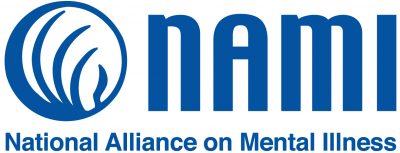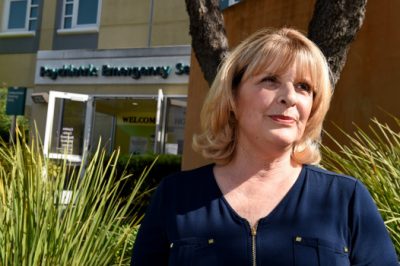
(7-10-18) This is the first of four blogs by parents with loved ones suffering from a serious mental illness. (SMI) These blogs were written after a consulting group held a telephone conference call with these parents at the request of the National Alliance on Mental Illness which is in the midst of developing a multi-year strategic plan. You can agree or disagree by commenting on my Facebook page.)
A Report From Teresa Pasquini About Her Attempt To Build Bridges At NAMI
In January of 2018, Pete kindly shared a letter with his readers that I wrote to him regarding my effort to build a bridge to NAMI for families like mine. In that letter, I committed to reassessing the petition that I had started in January of 2017. It was directed to the Executive Director of NAMI, Mary Giliberti, and the NAMI Board of Directors.
Today, I would like to update Pete’s readers and the petition signers about my recent efforts to build bridges, not walls, with NAMI.

Susan Tripp Pollard/Bay Area News Group)
In April 2018, I contacted NAMI CEO Giliberti and Jessica Cruz, Executive Director of NAMI California, where I live, to express my desire to create a space for open dialog with NAMI leadership and the families of those living with serious mental illnesses. I specifically asked both to consider establishing a Families of Adult SMI Advisory Council.
It was a reasonable request since NAMI has a process for establishing the current councils that advise each of their boards.
I thought that this would be a positive path forward and help ease the tension that was created during the 2017 Board of Directors election process for NAMI. (Describe in yesterday’s blog post.)
I hoped that the moms and dads who are currently caring for seriously mentally ill loved ones would be given a seat at the tables where policy, finance, legislative and advocacy efforts are being prioritized.
I thought that a Family SMI Council would signal that NAMI values our perspectives that are often lost within the “big tent” strategy.
I received gracious responses from both Mary and Jessica along with an invitation from Mary to hold a conference call with me to discuss my thoughts and concerns. That call took place in May 2018 with Mary and Ron Honberg, NAMI’s Senior Advisor for Advocacy and public policy . During that call, we all respectfully discussed our feelings and positions. I expressed that I did not feel represented by the four existing NAMI advisory councils. Currently, they are: 1. Peer Leadership Council (Individuals who live with mental illnesses) 2. Executive Directors Council (Executive directors of all NAMI State organizations) 3. Service Members, Veterans and their Families (Active-duty military of veterans with lived experience or their family members) 4. State Presidents Council (Current presidents of NAMI State Organizations.
I also did not believe NAMI’s current strategic planning process for the years 2020-2025 adequately addressed our needs.
I asked them to seriously consider establishing an SMI Family Council as a gesture of intentional partnership.
Mary suggested that NAMI already has many staff people and members who are siblings and parents of SMI loved ones who inform their work. I said that I didn’t believe that is the same as an independent advisory council that focused solely on policy and political issues affecting the SMI population. Mary agreed to take the request back to her leadership team and Board.
Mary then said that they are currently conducting Virtual Sessions of 10-15 people in a structured, facilitated conversation to inform their strategic planning process. She asked me if I could identify 10-15 SMI family members who would be willing to participate in a respectful dialog that would allow us to feel that we have offered a more in-depth contribution to the next Strategic Plan. I agreed to take her offer back to the Steering Committee of the National Shattering Silence Coalition (NSSC.) of which I am a member.
The NSSC Steering Committee agreed to participate in the Virtual Strategy Session facilitated by a 3rd party organization who is holding these “neutral” listening sessions across the country as the first phase of their strategic planning process. Jeanne Allen Gore, the Coordinator of the NSSC and I collaborated on a list of invitees who were mostly NSSC members who would be representative SMI family voices of the 4%.
The call was scheduled for Thursday, June 21st. The invitees were excited to have an honest opportunity to demonstrate the values and vision that the NSSC holds and convince NAMI leaders that we are allies, not adversaries. We were determined to show NAMI the need to build authentic partnerships that elevate our voices in the organization.
However, prior to the Virtual Strategy Session, I received an email from Mary that stated that she had discussed my request to create a Family Adults SMI Advisory Council to the NAMI Board with key leaders of the board and that they were all in agreement that while “…establishing a dialogue with you and other coalition members would be helpful, we are also in agreement that creating an additional Council to the NAMI Board would not be the best way to proceed.”
An alternative approach was offered that would include bi-annual telephone meetings between the leadership of NAMI and the NSSC. Mary indicated a sincere desire to establish a “communication mechanism” that would help facilitate “the frank exchange of perspectives and ideas on policy and advocacy priorities.
I expressed my disappointment to Mary and Ron Honberg in my reply:
“I have to say that I am personally disappointed that the idea of a Family Adults Advisory Council was not given more consideration. I do understand that it might require future organizational planning and coordination with states. This can and should be considered if NAMI is truly interested in an authentic partnership with the families who are the original founders of the organization yet often feel marginalized within the current structure. However, Jeanne and I will ask our coalition to objectively consider your offer for continued bi-annual dialog with the hope of creating pathways of shared learning.”
The Virtual Strategic Planning session took place last week. It was a powerful gut-level sharing of pain, suffering, and wisdom along with a desperate cry for NAMI to see us, hear us and partner with ALL of us in a genuine and formal way.
I stand in awe of families like mine who continue to show up with grit and grace as our loved ones are drowning and dying slowly while we try to help them survive in a system that doesn’t seem to care. And so many of us are drowning and dying too while we beg for help in a system of luck and heroics.
I am hopeful that the power of the passionate pleas expressed during the virtual session will be heard and felt by the NAMI national office and given priority in their next strategic plan. That plan must not tokenize the voices of the parents who are respectfully asking for equity. We are not asking NAMI to focus solely on SMI.
We are asking for NAMI to help us build a bridge to a whole system of care for all. And all means all.
I intend to see “one care” everywhere for families like mine. I will continuously seek opportunities to inspire meaningful and measurable system change for people living with serious mental illnesses who are suffering without access to safe, effective, patient/family-centered, timely, efficient and equitable care.
After the conversation, those on the call received a short text from the facilitator hired by NAMI.
Immediately following our conversation yesterday, we shared an initial report out with key takeaways with the leaders at NAMI who are overseeing the strategic planning process. They were meeting with Mary today and planned to share these with her. What we shared included this group’s frustration that Mary or another national rep was not part of the conversation; your impassioned plea for NAMI to be a louder/stronger advocate for legislation, policy, treatment, funding, etc. that will better support those with serious mental illnesses who do not know they are sick/will not voluntarily seek treatment; your feeling of being marginalized within NAMI and your strong desire to be represented through a council to the board. We also noted our strong sense that you all do not want to be in opposition to NAMI but rather you want to be a part of NAMI, have NAMI represent your voice and see NAMI working for you and your loved ones.We will continue to elevate these issues as we move forward in the strategic planning process and incorporate them into the results of our listening process which will be developed in July.
I believe I have accurately explained what has happened during the past several weeks.
While I appreciate the willingness of NAMI leadership to listen to our concern, I am disappointed that NAMI has refused to consider the creation of a separate Family Adult SMI Advisory Council.
About the author: (From National Shattering Silence Coalition webpage)
Teresa Pasquini advocates for reforming and improving the nation’s mental health system. As a family member of a son and brother living with serious mental illness, her 45-year personal experience drives her passion. As a nine-year member of the Contra Costa County Mental Health Commission, she was an outspoken champion for all. She’s a founding member of the Behavioral Healthcare Partnership at Contra Costa Regional Medical Center, a safety net hospital. She’s a co-founder of Mental Illness FACTS/Right 2 Treatment, a grassroots campaign focused on quality standards and equity in care for serious mental illnesses. She’s provided testimony in multiple forums including the Institute of Healthcare Improvement, the National Quality Forum, and an event on Capitol Hill advocating for The Helping Families in Mental Health Crisis Act. The Bay Area Newsgroup recently recognized Teresa for her local mental health advocacy during 2017s Women’s History Month.



